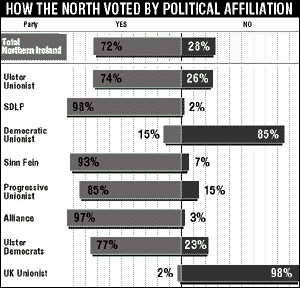
|

| Peace settlement
endorsed by 71% of voters in Northern Ireland and 94% of voters in the
Republic of Ireland |

85.5% of the votes
cast in the North and the South backed the peace deal. It was the first
all-Ireland poll since 1918, when the six Ulster counties remained part
of the UK whereas the rest became the Free State of Ireland.
Tony Blair, the
British prime minister, said on Saturday after the referendums: 'There
is no place for the gun and the bomb or violence in the politics of Northern
Ireland or any of the islands of Ireland. All that is over and gone now.'
A poll conducted
for The Sunday Times showed that a majority of people in the 17
of the northern province's 18 parliamentary constituencies voted in favour
of the agreement. Only Ian Paisley's Antrim North constituency rejected
the settlement.
The next step will
be on June 25 when the 108-seat Northern Ireland assembly will be elected.
David Trimble's
Unionist Party will now urge Sinn Fein to do anything to persuade the republican
paramilitaries to decommision their weapons. This will be the litmus test
for Sinn Fein to prove their honesty. Only by disarming and disbanding
the military machinery will there be lasting peace in Northern Ireland. |
| The
weeks ahead
The agreement which
all parties and paramilitary groups more or less enthuasistically subscribed
to is nobody's ideal, to be sure, but everyone's acceptable second choice.
There are no outright winners, but there are no losers, either.
Ahead lie the following
problems:
1. the before mentioned
arms decommissioning,
2. the early release
of prisoners,
3. a fundamental
overhaul of NI's justice and policing systems,
4. the managenment
of the marching season, which usually begins about July 12.
These are big issues
which the Northern Ireland assembly will have to address. It will definitely
take some time.
The Northern Ireland
Assembly
Since 1974 it will
be the first power-sharing administration, which will be elected from 18
constituencies each of which will have the right to send 6 candidates into
the assembly. Out of 44 nationalist seats Sinn Fein will probably occupy
19 seats, the biggest nationalist party, John Hume's SDLP, will receive
most of the remaining seats. David Trimble's Ulster Unionists will pick
up 29 seats and Ian Paisley's No-campaigners might get 22 seats. Ian Paisley's
supporters will probably wreck any attempts to foster links between Belfast
and Dublin.
By the way, each
elected member to the assembly will be paid c.70,000 pounds, including
expenses and allowances. Not a bad job... a reason why there will be plenty
of candidates. |
| The key points
of the Northern Ireland Peace Agreement (April 98): |
| 1. |
The principle of consent is to be recognized,
i.e. Northern Ireland is to be part of the UK while its people so wish.
The Republic of Ireland is to amend articles two and three of its constitution
as to removing its claim on Northern Ireland. Conversely Britain is to
repeal the Government of Ireland Act of 1920. |
| 2. |
ANorthern
Irish assemblyof 108 members is to be elected on the basis of proportional
representation.The assembly is to be run by an executive committee of 12
members from various parties. |
| 3. |
A North-south
ministerial council is to be set up by the assembly to direct co-operation
between Ulster and Ireland. |
| 4. |
A Council
of the Isles is to be established with members from the parliaments
at Westminster, Dublin and Edinburgh, the Northern Ireland assembly and
the Welsh assembly. |
| 5. |
All
participants are to be committed to disarmament of paramilitary organizations. |
The
settlement was hammered out by both Protestant and Catholic political representatives
and George Michael, the chaiman of the talks and former US Senate
leader. Indirectly involved in the negotiations was the American president. |
| On
the Protestant (pro British) side were: |
On the Catholic (pro Ireland) side were: |
Tony
Blair, the British Prime Minister
Mo Mowlam, the Northern
Ireland Secretary
David Trimble, Ulster
Unionist Party
Ian Paisley, Democratic
Unionist Party
David Ervine, Progressive
Unionist Party
Gary McMichael,
Ulster Democratic Party |
Bertie
Ahern, the Irish PM (called taoiseach)
John Hume, SDLP
Gerry Adams, Sinn
Fein, linked to IRA
Lord Alderdice,
Alliance Party (non-sectarian)
The agreement's full
text is on the Internet edition of The
Sunday Times. |
|

